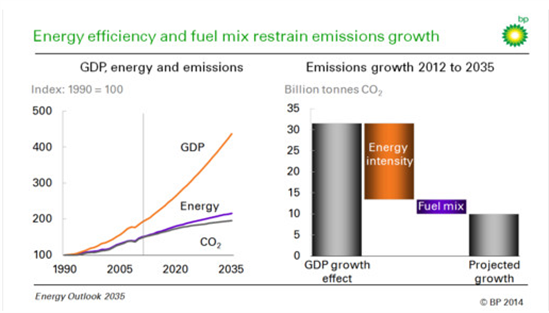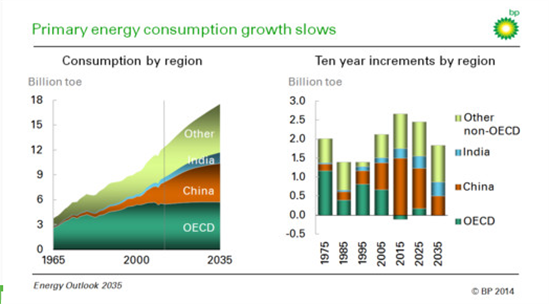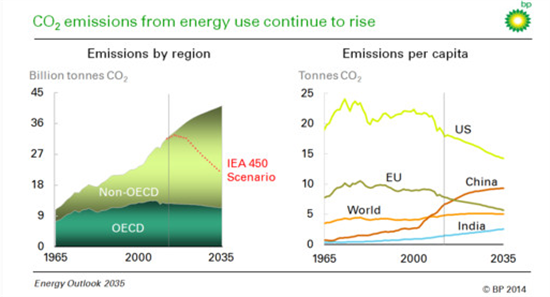We’re all going to have access to lots of energy over the next couple of decades, predicts BP. There’s just one snag: greenhouse gas emissions are set to keep rising.
The world’s population is growing by 200,000 people a day, according to the World Bank, and is predicted to top eight billion by 2030. That’s a lot of people in need of an energy supply to light and heat their homes, cook food, and get about.
Energy company BP says supplying the energy isn’t going to be a problem, however. As the world increasingly turns to unconventional fossil fuel sources like shale gas and oil under the sea, there’s going to be plenty of energy to go round, it predicts.
But continued reliance on cheap – and plentiful – fossil fuels means the world the world’s greenhouse gas emissions are expected to rise by nearly a third by 2035.
Thinking two decades ahead
BP’s predictions are contained in its latest annual ‘ Energy Outlook‘ report. It has updated last year’s report so that it now looks another five years ahead to 2035.
BP says its report describes just one ‘ most likely‘ prediction of what the global energy system might look like in the future. Because the report doesn’t explore other scenarios, the prediction should carry a health warning – as there’s a lot of unknowns in predictions about future economic growth, changing populations and new technologies.
We need lots of energy, we’ve got lots of energy
So what does BP see in the future? First – the world’s going to need a lot more energy. BP predicts a 41 per cent increase in energy demand around the world by 2035. 95 per cent of that growth will come from rapidly industrialising countries outside the Organisation for Economic Co-operation and Development (OECD), it says.
That’s actually a decrease in the rate of growth from the last twenty years, but it’s still pretty significant in absolute terms, as this graph illustrates:
Source: All graphs are taken from slides at today’s launch event.
But increasing energy demand isn’t a problem, BP says. New technologies mean it’s now possible to reach huge oil and gas reserves under the surface of the earth, once thought to be inaccessible. The best known of these techniques is hydraulic fracturing – or fracking – of shale rock, to extract shale gas and shale oil.
Christoph Ruehl, group chief economist at BP and lead author of the report, says in an article in the Financial Times that the new unconventional fuels mean there is ” ample resource” available around the world to meet increased energy demand.
Emissions going up
But there’s a problem. According to BP’s predictions, 81 per cent of primary energy demand around the world will come from oil, coal and gas by 2035. By contrast, renewables will represent just seven per cent of supply. And that’s not good news for carbon emissions.
There is one caveat. The company says that energy use around the world is getting more efficient. Energy intensity – a technical term for the amount of energy needed to produce one unit of GDP – is falling around the world, it says. Increased global integration, the development of new technologies and rising prices all mean countries are becoming more efficient in the way they use energy: 
More efficient use of energy means greenhouse gas emissions don’t go up as much. But, the effect isn’t big enough to constrain rising greenhouse gas emissions. Global carbon dioxide emissions are projected to rise by 29 per cent by 2035, BP suggests.
In the graph above, the red dotted line marks the reduction in emissions that would be needed to keep global greenhouse gas emissions to 450 parts per million. Exceeding this limit means it is unlikely we can avoid a temperature rise of more than two degrees celsius above pre-industrial levels, widely considered to mean “dangerous” climate change.
In his presentation, Ruehl remarked that “now everyone agrees” the world is not going to achieve this – adding that “if preferences change and people think carbon emissions have to be curtailed” then BP’s predictions would also change. For the moment, the energy company seems to think that isn’t going to happen. If it’s true, this may be good news for BP’s shareholders – but not such good news for emissions.



